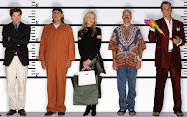Critics didn't love the pilot of Dollhouse, and to be honest, I wasn't crazy about it either. There was obvious studio head meddling going into the narrative. The opening "introduction" to Echo was so short it had to be afterthought, and the closing snippet about Alpha's escape was an obvious last-minute push to add mystery and intrigue to these characters and their relationships with one another. So without going into too much about the pilot, I say -- skip it and watch the second one. The second episode, "The Target," is a much better hour of television and you get all of the introductory materials (via well-used flashbacks) in a more cohesive and less disorienting way.
"The Target" was based off of Richard Connell's short story The Most Dangerous Game" (which you can read in its entirety here), with a slight twist at the end. There are three reasons why this episode worked really well -- and why I ultimately recommend the show, basing my judgements on something other than gratuitous love for creator Joss Whedon. First, Elisha Dushku can only act one role (tough/vulnerable/naive) -- BUT you hardly notice her inability to act when she's playing this role. (See also Faith on Buffy the Vampire Slayer.) In the pilot, she played a hostage negotiator, complete with inhaler (huh?) and glasses (seriously?), and Dushku didn't sell it. But here, in "The Target," she sells that she's a sportsman and that her shift to retaliate is plausible and engaging. Second, this episode showed more of her relationship with her handler, Boyd Langdon (played ever-so wonderfully by Harry Lennix). We learn why she instantly trusts him (she was programmed to trust him when he says the phrase "Everything is going to be okay"), and we learn how Langdon was initially brought into the Dollhouse. He became Echo's new handler when Alpha went all Patrick Bateman on everyone, including her previous handler, but without touching Echo. And third, the flashbacks offered a fluid narrative device in showing -- and not telling! -- us about Echo's resurfacing memories. Whereas in the pilot, Echo remembered things kind of randomly, but here, with this narrative device, Echo gains access to privileged information, just as we do in learning about Langdon, Alpha, and the Dollhouse.
 So here's my theory, one that I think leans more towards the humanist side in all of this, but not in any way that would detract from the science or morality of the show. I don't think Echo is the first doll to recover suppressed memories. (Certainly Topher isn't "erasing" or extracting memories; he's merely relocating them in the brain.) I think Alpha was the first doll to start remembering his missions, and when he learned of his true identity -- either his "real world" identity or his identity (or lackthereof) as a doll -- he decided to load into his brain martial arts skills in order to defend himself. Remember, Topher says that Alpha implanted HIMSELF with those skills, so why and how could he do this? He did this because he knew the truth about the dollhouse.
So here's my theory, one that I think leans more towards the humanist side in all of this, but not in any way that would detract from the science or morality of the show. I don't think Echo is the first doll to recover suppressed memories. (Certainly Topher isn't "erasing" or extracting memories; he's merely relocating them in the brain.) I think Alpha was the first doll to start remembering his missions, and when he learned of his true identity -- either his "real world" identity or his identity (or lackthereof) as a doll -- he decided to load into his brain martial arts skills in order to defend himself. Remember, Topher says that Alpha implanted HIMSELF with those skills, so why and how could he do this? He did this because he knew the truth about the dollhouse.So what does that have to do with Alpha's Echo trail for Agent Ballard (who, I'm convinced, is named after the sci-fi writer J. G. Ballard)? I'm not too sure, but I definitely think Alpha has feelings for Echo. I think he fell in love with her, and every time her memories were altered and went back to a tabula rasa state, Alpha grew increasingly angrier with his and her situation. This theory falls apart when you consider Ballard in the mix (why doesn't Alpha just expose the Dollhouse immediately?) or Echo (why didn't Alpha just take Echo with him when he escaped?), but both of these concerns could certainly be answered later and still be in line with my theory.
Basically... I want the show to be more about interpersonal relationships than ethics. Is the Dollhouse ethical? Are the dolls still people without memories? (For what is the "I" if the "I" has no past?) How long will Boyd Langdon have qualms, inner conflicts regarding the Dollhouse? I'm more concerned about Alpha and his relationship to Echo. And even if it isn't romantic, perhaps he thinks of her like his sister. And hopefully -- since Alan Tudyk will be playing the as-of-yet unseen role -- Alpha will have an ironic sense of humor. Alpha can be dark and twisty, but he can also be fun to watch.









.jpg)


1 comment:
Richard Connell. *facepalm* Yeah, that went right over my head.
Whatever Alpha's story is, I'm pretty sure it doesn't involve psychotropic drugs - they'd have examined his record with a fine-toothed comb, and they'd be doing blood tests.
(Shoulder-To-The-Wheel certainly thought it was a likely scenario that Echo would stumble on that cabin on the way to the river... was the canteen his idea? I don't think Alpha has the contacts necessary to fabricate the entire background of "Richard Connell", either - are the unidentified people backing Ballard's mission pulling all the strings?)
Post a Comment